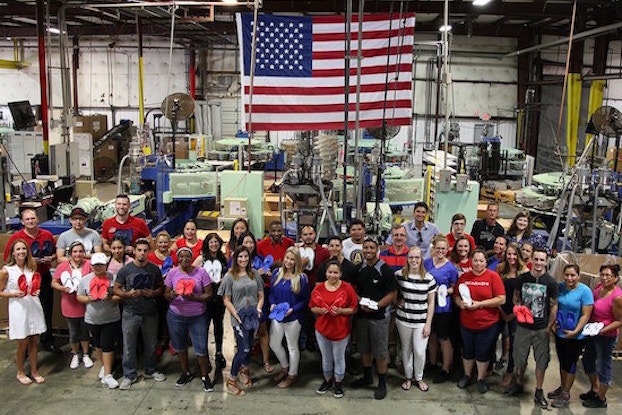
Sara Irvani is always looking for a good fit. And not just when it comes to the 1.2 million flip flops and sandals her Buford, Ga.-based company manufactures every year. Irvani, CEO of Okabashi Brands, believes finding a good fit is essential to broadening the shoe manufacturer’s retail reach.
“It’s important to have the right brand for each retailer,” Irvani told CO—. “You have to have a cohesive strategy for your company and the retailer. And that means knowing your customer.”
That approach has served Okabashi well. The company’s shoes are now sold in more than 5,000 retail locations, including Target, Macy’s, Bloomingdales, J. Crew, CVS and Walgreens. The company, which was founded by Irvani’s father in 1984, has three distinct shoe brands — each of which is targeted to a different customer base.
Its Okabashi brand shoe retails primarily at drug stores and some specialty shops. It’s Oka-B is a higher-end line for boutiques and spas, and its newly launched Third Oak is targets style and environmentally conscious millennials through retailers.
You have to have a cohesive strategy for your company and the retailer. And that means knowing your customer.Sara Irvani, CEO, Okabashi Brands
Target right
Okabashi Brands CEO Sara Irvani places emphasis on matching her products with the right retailers, and, thus, the right customers. Read on for more ways your business can reach its optimal customers.
Breaking into new retail sales channels isn’t easy. Irvani said the key was first knowing which of its product lines were right for which retailer and being prepared to explain how each line made sense for each customer base.
“Persistence is key here,” said Irvani, who took over as CEO in 2017. “People are busy and are not necessarily going to reach out after your first call or email. You have to be prepared to explain how it is good for them.”
The first step in many of its retail relationships is offering the shoes on a drop-ship basis, meaning online retailers do not need to carry the inventory to sell it, but rather Okabashi ships direct to the retailer’s customer after the sale is made. Those tests usually lead to in-store placement, Irvani said.

Knowing your customer
“Sell-through is the key to maintaining any relationship,” she said. “You need to have something that is compelling for their customers to try and for them to sell. You really need to have your message for their customer.”
For Okabashi, that compelling story comes down to three things: comfort, sustainability and manufacturing in the United States.
Though stylish, Okabashi also focuses on creating shoes with foot health in mind. Emphasis on arch support, massage beads and toe rests make their shoes desirable for customers looking for more than a standard flat-bottomed flip flop.
And while comfort is important to many of its customers, the fact that Okabashi’s shoes are also made sustainably has increasingly been a selling point for certain customer segments.
Its shoes contain, on average, 25% recycled material, and it recycles as much of the scrap material from its manufacturing process as possible — around 100,000 pounds a year — that would otherwise be waste. With its circular recycling program, it invites customers to send their old shoes back in return for a 15% discount.
Sustainable in more ways than one
The opportunity to focus more squarely on its sustainable practices led, in part, to Irvani launching its Third Oak brand in 2018. Third Oak rounds out its brand offering by creating a line that showcases its commitment to environmental stewardship for a customer base that prefers to spend with socially responsible companies.
But sustainability is not a new development for Okabashi. It’s the way the company has always operated. And its sustainability efforts aren’t just about doing right by the environment. It’s also about creating a sustainable business model. Recycling and repurposing make sense economically.
“That’s because we are a value driven business,” Irvani said. We made this commitment when it was nearly impossible to make products in United States because our competitors, who had moved production overseas, had a much lower cost, Irvani said.
Finding ways to continue to manufacture domestically has meant keeping a close eye on customer feedback. Irvani spends four days a week in the factory with her 100+ employees. Her desk is next to the customer service area, so she can stay tuned in to what her customers are saying. Her focus on both retail and consumer feedback is paying off.
“Only 1% of shoes are made in [the] U.S.,” she said. “So, few companies have managed to survive, let alone thrive. You need to think extra smart and work extra hard. It allows us to do what many think is impossible.”
CO— aims to bring you inspiration from leading respected experts. However, before making any business decision, you should consult a professional who can advise you based on your individual situation.
CO—is committed to helping you start, run and grow your small business. Learn more about the benefits of small business membership in the U.S. Chamber of Commerce, here.




